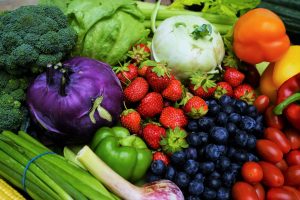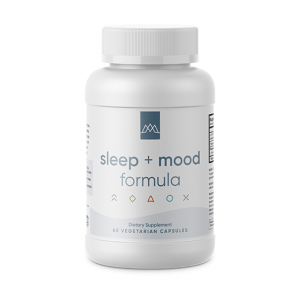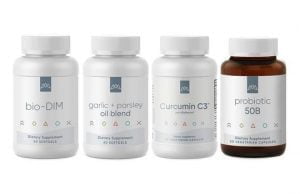You’ve likely had a family member or friend who had cancer. Maybe you’ve had it yourself. You know how devastating this disease can be. You’re not alone: Researchers have predicted 1,806,590 new cancer cases and 606,520 cancer deaths among Americans in 2020.[1]
There are over 100 types of cancer. They occur when abnormal cells grow out of control, invade certain tissues such as the lungs, and spread. While cancer usually starts in one organ, it can eventually reach the entire body.[2]
Cancer: What You Can and Can’t Control
With cancer, some factors are beyond your control. If cancer runs in your family, you’re more likely to get it. Your genes contribute to about five to 10 percent of all cancers.[3] Age can also play a role. Most people diagnosed with cancer are over 65.
Many factors, however, are within your control. Between 30 – 50 percent of all cancer is preventable.[4] As preventative measures, experts recommend to:
- Stop smoking
- Eliminate alcohol (or limit to one drink for women or two for men daily)
- Get cancer screenings and visit your healthcare practitioner regularly
- Practice sun safety and monitor your sun exposure [5] [6]
All of these things are important to reduce your risk of cancer. One thing, however, you get to control several times every day is what you eat.
Reduce Cancer with Your Fork
What you eat helps maintain a strong immune system and fight disease, including cancer. Eating sugary, processed foods can increase your risk of cancer.[7] Healthy foods, on the other hand, have supportive nutrients that can protect against cancer.
Our Core and Advanced Plans offer a wide array of nutrients the body needs to thrive and reduce your risk of disease. Studies show that wild-caught seafood, for instance, may help lower specific types of cancer, including colorectal cancer and prostate cancer. [8] [9]
 You’ll also want to focus on plant foods. Your best cancer-fighting food choices include:
You’ll also want to focus on plant foods. Your best cancer-fighting food choices include:
- Studies show the antioxidants in strawberries, blueberries, and other berries can reduce your risk of cancer.[10]
- Cruciferous vegetables. Cauliflower, cabbage, kale, Brussels sprouts, and broccoli have two nutrients that can reduce your risk of cancer.
- A compound called sulforaphane supports your body’s immune system and helps eliminate cancer-causing chemicals.[11]
- Indole-3-carbinol or I3C breaks down in the body to form a substance called diindolylmethane or DIM. One study found that I3C could slow the tumor growth associated with prostate cancer.[12]
- Allium vegetables. Garlic, onions, shallots, leeks, and chives can help lower the risk of some cancers.[13] Their unique sulfur compounds are what promote the broad range of its health benefits.
6 More Ways to Reduce Your Cancer Risk
Research shows that about 42 percent of cancer cases and 45 percent of cancer deaths in America are linked to modifiable risk factors and therefore are preventable.[14]

In other words, the healthy choices that you make every day can go a long way toward reducing your risk of cancer. Along with a healthy diet, focusing on these six areas can help you stay lean, healthy, and free of disease.
- A healthy weight. Obesity increases the risk of many cancers. A keto diet makes a great way to find your goal weight and maintain it.
- Environmental toxins. We have over 100,000 chemicals in our environment, including the cosmetics we use daily. Some of these chemicals can be cancer-causing.[15] You can learn more here about how to reduce your toxic exposure.
- Exercise. Regular exercise can reduce risk of many types of cancer, including breast cancer and colon cancer. All movement counts, including walking. One study of 80,000 adults found that strength training twice a week reduced the likelihood of dying from cancer by 31 percent.[16]
- Stress. Long-term stress creates a burden on the body, which may contribute to cancer.[17] Find ways to reduce stress and use them regularly. Yours might be meditation, yoga, deep breathing, or laughter. Here are 16 ways to relieve stress.
- Sleep. Not getting enough sleep can lower hormones like melatonin that protect against cancer.[18] Aim for eight hours of quality, uninterrupted sleep every night. Our Sleep + Mood Formula can help you safely fall and stay asleep.
- Nutrients. Getting the right amounts of key cancer-reducing nutrients from foods like garlic and broccoli can be hard. That’s why we created our Cell Support Bundle. We’ve combined four formulas that provide the active compounds to protect against disease.

References
[1] https://acsjournals.onlinelibrary.wiley.com/doi/full/10.3322/caac.21590
[2] https://www.medicalnewstoday.com/articles/325219#Cancer-and-cruciferous-vegetables
[3] https://www.cancer.gov/about-cancer/causes-prevention/genetics#
[4] https://www.who.int/cancer/prevention/en/
[5] https://www.cancer.org/latest-news/6-steps-to-help-lower-your-cancer-risk.html
[6] https://es.oncolink.org/riesgo-y-prevencion/factores-ambientales-exposicion-uv-radon-radiacion/sun-exposure-and-cancer-risk
[7] https://www.webmd.com/cancer/features/cancer-sugar-link#1
[8] https://www.ncbi.nlm.nih.gov/pmc/articles/PMC4532991/
[9] https://www.ncbi.nlm.nih.gov/pmc/articles/PMC3629172/
[10] https://www.ncbi.nlm.nih.gov/pmc/articles/PMC5187535/
[11] https://www.health.com/condition/cancer/6-cancer-fighting-superfoods#
[12] https://science.sciencemag.org/content/364/6441/eaau0159
[13] https://www.ncbi.nlm.nih.gov/pmc/articles/PMC4366009/
[14] https://www.cancer.org/latest-news/more-than-4-in-10-cancers-and-cancer-deaths-linked-to-modifiable-risk-factors.html#
[15] https://www.ncbi.nlm.nih.gov/pmc/articles/PMC3521879/#
[16] https://www.nfcr.org/blog/cancer-prevention-which-type-of-exercise-lowers-your-risk/#
[17] https://www.ncbi.nlm.nih.gov/pmc/articles/PMC3037818/
[18] https://www.webmd.com/cancer/news/20031001/how-sleep-affects-cancer#1





